MusicWeb interviews with Maestro Serebrier: Ann
Ozorio Gavin
Dixon
Glazunov has been one of my favourite composers since the days
of hearing broadcasts of the Fifth Symphony by the BBC Northern,
relays of the EMI-Melodiya Nathan Rakhlin Fourth Symphony (HMV
Melodiya ASD 3238), Boris Khaikin’s The Seasons (ASD2522
- in the 1970s a regular on the Radio 3 morning strand) and
Jose Sivo’s Violin Concerto (Decca SXL6532 but now on HDCD).
With this in the background I have wanted to review this set
as a complete sequence since first hearing Serebrier’s spine-tingling
version of the Fourth Symphony – of which more later.
Alexander Glazunov was a child prodigy of sixteen when his first
symphony was performed. José Serebrier was the same age when
Leopold Stokowski premiered his first symphony as a last-minute
replacement for the Ives Fourth Symphony. It can be heard on
the Guild
label. Stokowski and Serebrier collaborated over the pioneering
recording of the Ives Fourth for CBS
in the mid-1960s and, in another act of symmetry, Serebrier
later went on to record it himself for RCA.
With the fifth release in this series Warner and Serebrier complete
their cycle of the nine Glazunov symphonies. The conductor’s
account of the project and his perspectives on Glazunov can
be read in detail in a fascinating interview by Gavin
Dixon. Serebrier tell us that Glazunov is a composer close
to his heart. I can well believe that. As much can be heard
in these recordings. The conductor goes on to say that Glazunov’s
music has been neglected in part because “some performers have
played it rather "literally", without reading what's
behind the notes. If played metronomically and without emotion,
the music can sound uninteresting. It requires passion and subtlety.”
You can hear Serebrier’s approach in its quintessence in the
first two movements of the Fifth Symphony. In the first he builds
tension and exposes structural cogency through mercurial spontaneity.
It strikes me as instinctive but I am sure there is more to
it than that. Hearing Glazunov from a non-simpatico conductor
is like experiencing a flat and tepid wine designed to be enjoyed
chilled and sparkling. A Glazunov Scherzo is a thing of wonder
and Serebrier finds the mot juste in the Fifth. He unleashes
a reeling kinetic excitement in the finale making links with
Rachmaninov forwards and retrospectively with his teacher Rimsky-Korsakov.
On the same disc as No. 5 comes the ballet, The Seasons.
It’s one his most Tchaikovskian works yet in Serebrier’s hands
escapes any suggestion of being a warmed-over Swan Lake or
Nutcracker. Ice and Hail from Winter
are most touchingly pointed up making the notes leap to
attention off the pages of the score. Warner is to be congratulated
on separately tracking each section within each of the four
seasons. The great curvaceous melody of Spring is most
sensitively wielded though perhaps a notch down from Ivanov.
The Coda from Summer sheerly flies yet does not
become a gabble. If you enjoy your Tchaikovsky ballets do not
miss out on this version of the Glazunov – winning ideas tumble
one after the other.
I owe it to Ann Ozorio that I heard the first disc in the cycle.
At one of Len Mullenger’s earliest MWI reviewer get-togethers
at Keresley just outside Coventry she passed me a review copy
which she had received after her interview with Serebrier. I
have long been a Glazunov admirer and played the disc on the
2 hour plus journey back to the North-West. It is the recording
of the Fourth Symphony to have. Serebrier’s hesitations and
pressings-forward are just superbly judged, nudged and weighted.
You can hear and know that within the first three minutes
of the first movement. It’s the same in the finale with a belting
acceleration from reflective to exuberant and impetuous. Serebrier
treats the Symphony with a sort of loving respect which eschews
self-indulgence. The oboe’s song at 4:21 in the first movement
and its expressive twists and turns at 6:08 have never sounded
this good - not since the Rakhlin Melodiya recording. At the
other extreme Jacques Rachmilovitch and the Santa Cecilia Orchestra
in an ancient 1950s recording usefully revived by Pristine is
just too much of a breathless sprint. Serebrier’s unerring judgment
for pacing sweeps all before it in the finale of this glorious
symphony.
The Seventh is more relaxed as its title might suggest. It bubbles
and lilts delightfully but although Serebrier gives it some
steel especially in the Andante (II) and the Scherzo (those
gruffly accented brass and timps accents at 2:05) this is clearly
a work with a shade less tension than its disc-mate, the Fourth.
I listened to the Scherzo in the hands of Golovanov in his circa
1950 version with the Soviet State Radio Orchestra. Serebrier
works from the same book but here what is shown up is the superiority
of the RSNO wind principals who never lose definition in quite
the way that the Soviet orchestra counterparts do under Golovanov’s
typically wilful incitement. I also listened to Rozhdestvensky
giving the symphony an outing on Olympia OCD100 with the USSR
Ministry of Culture Symphony Orchestra. He is nowhere near as
tense as Serebrier and Golovanov and although he is recorded
finely the effect does not work as well as either of the other
two interpreters.
I always rather liked the Eighth Symphony even if it has come
in for some stick in various quarters. It was his last completed
symphony. My impressions and expectations were shaped by the
Svetlanov EMI-Melodiya LP – a rousing version. Glazunov comes
away with a truly sumptuous theme at 3:01 (I) and even if it
is given treatments that are redolent of Tchaikovsky and Rachmaninov
it works superbly. I an usually allergic to fugal writing but
the Elgarian cauldron whipped up at 2:30 and again and again
later in the finale is irresistibly heroic. Same goes for those
high-striding horns at 8:01 and the tramping indefatigable energy
of the last pages. The resonant qualities of the Henry Wood
Hall also play their part.
I find the delights of Raymonda rather wan after such
intensity; perhaps Warners should have reversed the order of
the works on the CD. In any event it is charming stuff even
if not up to the standards of The Seasons. The glowing
Soir, Clair de Lune (tr. 10) stands above the general
mêlée here as does the fine Valse Fantastique.
The Sixth Symphony is as Andrew Huth - who writes the informative
liner essays for most of the series - says in his notes the
one closest in style to Tchaikovsky. It at first wears its tragedy
heavily and recalls the Pathétique in the first movement.
Glazunov could never resist a Scherzo and he did them very well.
This one is a shade more deliberate than its counterparts in
the flanking symphonies. The finale has the iron-shod tramping
power of the finale of the Rachmaninov First Symphony finale
a work which Glazunov was infamously to conduct a month after
he conducted the premiere of his own Sixth. His tone poem The
Sea was written when the composer was in his twenties. It
is a pleasingly stormy romantic work which after the tempests
revels in a lighter lyric mood. It ends in what seems night-scene
in which the sea glimmers poetically in the moonlight. The scene
closes but not before a final macabre shudder from the depths.
It is usually pigeonholed alongside his other atmospheric pictorial
poems: The Kremlin (1890), The Forest (1887) and
Oriental Rhapsody (1889). The richly romantic Salome
music written in 1907 for a St Petersburg production of
the Oscar Wilde play ends the disc.
The last volume to be issued was a two disc set. Hearing the
long gait of the Third Symphony’s first movement reminded me
how the composer had, over the twenty year period spanned by
the eight symphonies, held true to Russian nationalist style.
It remains very enjoyable and full of the eager effervescence
of invention. The style is closer to that of his teacher Rimsky-Korsakov
but the pleasures are no less even if extended across 48 minutes
and his usual four movements. It’s the longest of his symphonies.
The incomplete Ninth was left in piano score and passed to a
cousin of the pianist Mariya Yudina who orchestrated the single
movement from piano score in 1947-48, twelve years after Glazunov’s
death. It has an Elgarian nobilmente about it and not
unsurprisingly seems to be from the same notebook as the finale
of the Eighth.
The Second Symphony is five minutes shorter. It was premiered
by the composer at the 1889 World Exhibition in Paris. The lugubriously
romantic second movement for me recalls the Balakirev First
Symphony. The finale is superbly rendered by the Warner engineers
and the artists with plenty of antiphonal detailing.
We end with the enjoyable First Symphony. This too is in the
accustomed four movements with several moments particularly
reminiscent again of Rimsky and of Borodin’s Prince Igor.
It will be recalled that Glazunov assisted with the completion
of Borodin’s Third Symphony. The invention is a step down from
the finest symphonies and the finale occasionally succumbs to
bombast but what is here is enjoyable and well worth discovering.
It is after all the work of a sixteen year old – the same age
as his pupil Shostakovich when he wrote his own First Symphony.
Over the years there have been several recorded cycles of the
symphonies. There’s rather good one from Rozhdestvensky (once
available complete and slip-cased on Olympia OCD5001). Then
again there’s Järvi’s 1980s on Orfeo (not reviewed here unfortunately).
Otaka recorded the eight symphonies for Bis.
Polyansky recorded most of them for Chandos and many of these
alongside some from Yondani Butt (ASV) and Otaka (Bis) found
their way into a bargain-priced set from Brilliant
Classics. Even the long-lost Fedoseyev Soviet (Moscow Radio
Symphony Orchestra) set can be had as an mp3 download via Amazon
for as little as £5.99. Though not without merit the least attractive
and sadly torpid cycle of the symphonies came from Naxos (Anissimov
review
review)
although no company has recorded as much Glazunov. Svetlanov’s
fine but long inaccessible set can now be had in a SVET box
(review
symphonies; review
orchestral works).
The Brilliant box is inexpensive and deploys mostly Chandos
sound quality. It’s pretty good though Polyansky can hit patches
of lassitude. The Svetlanov box can be difficult to source but
may be too old-sounding, raw and invigorating for some ears.
Even with all that heritage, Serebrier and Warner have the finest
modern premium price cycle available. It combines consistently
inspired interpretative insights, Imperial Russian style and
superb audio-technology.
In the Gavin Dixon interview there is talk of the complete Glazunov
concertos. After the exalted results secured here I hope that
comes to pass.
Rob Barnett
The Glazunov symphonies conducted by José Serebrier on Warner
Classics
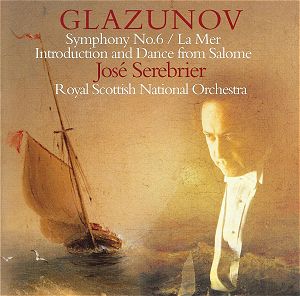 Alexander
GLAZUNOV (1865-1936)
Alexander
GLAZUNOV (1865-1936)
Symphony No. 6 in C minor op. 58 (1896) [35:51]
The Sea - Fantasy in E major op.28 (1890) [15:22]
Salome - Introduction and Dance op.90 (1908) [15:19]
Royal Scottish National Orchestra/José Serebrier
rec. 4-6 June 2008, Henry Wood Hall, Glasgow. DDD
WARNER CLASSICS 2564 69627-0 [66:48]
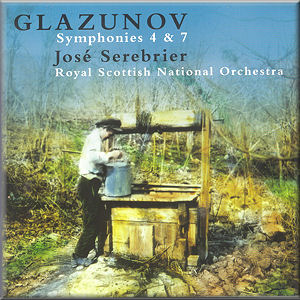 Alexander
GLAZUNOV (1865-1936)
Alexander
GLAZUNOV (1865-1936)
Symphony No. 4 in E flat major op. 48 (1893) [33:31]
Symphony No. 7 in F major op. 77 Pastoral (1902) [36:21]
Royal Scottish National Orchestra/José Serebrier rec. 28 February-2
March 2006, Henry Wood Hall, Glasgow. DDD
WARNER CLASSICS 2564 63236-2 [69:52]
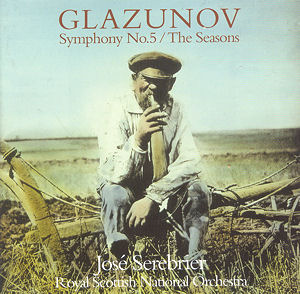 Alexander
GLAZUNOV (1865-1936)
Alexander
GLAZUNOV (1865-1936)
Symphony No. 5 in B flat major op. 55 (1895) [32:36]
The Seasons - ballet in one act - op. 67 (1901) [36:38]
Royal Scottish National Orchestra/José Serebrier
rec. 2-5 January 2004, Henry Wood Hall, Glasgow. DDD
WARNER CLASSICS 2564 61434-2 [70:31]
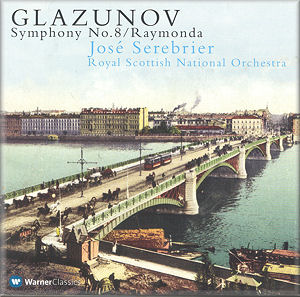 Alexander
GLAZUNOV (1865-1936)
Alexander
GLAZUNOV (1865-1936)
Symphony No. 8 in E flat major op. 83 (1905) [42:28]
Raymonda - suite from the ballet op. 57a (1898) [36:42]
Royal Scottish National Orchestra/José Serebrier
rec. 9-11 January 2005, Henry Wood Hall, Glasgow. DDD
WARNER CLASSICS 2564 61939-2 [78:50]
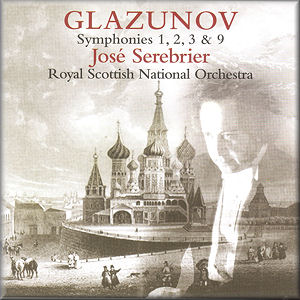 Alexander
GLAZUNOV (1865-1936)
Alexander
GLAZUNOV (1865-1936)
CD 1
Symphony No. 3 in D major, op. 33 (1890-92) [48:12]
Symphony No. 9 in D major, Unfinished orch. Gavriil Yudin
(1909) [10:32]
CD 2
Symphony No. 2 in F sharp minor, op. 16 (1886) [43:22]
Symphony No. 1 in E major, op. 5, Slavyanskaya (1881)
[34:17]
Royal Scottish National Orchestra/José Serebrier
rec. Henry Wood Hall, Glasgow, 2-5 June 2009. DDD
WARNER CLASSICS 2564 68904-2 [58:44 + 77:39]




 All Nimbus reviews
All Nimbus reviews








